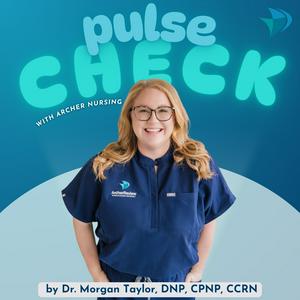In this episode, Dr. Morgan Taylor sits down with experienced family nurse practitioner, Hiva Kolodrubetz, to have an honest discussion about the nurse practitioner role—what it really looks like, who it’s right for, and how to know if (and when) you’re ready to take that step.
Together, they unpack the growing pressure many nurses feel to “just go to NP school,” why that mindset can be risky, and how role clarity, planning, and quality education matter far more than speed or titles.
Perfect for nursing students, bedside nurses, future NPs, and anyone questioning their next step in nursing. Tune in to gain clarity, confidence, and perspective before making a big career move.
Find everything Archer Review has to offer:
archerreview.link/PulseCheck
Use code PULSECHECK10 - an exclusive discount just for our listeners!
Connect with us!
📸 Instagram: @archernursing
📘 Facebook: Archer NCLEX Review
🎵 TikTok: @archernursing
▶️ YouTube: Archer Review NCLEX, USMLE, TEAS7, and FNP


